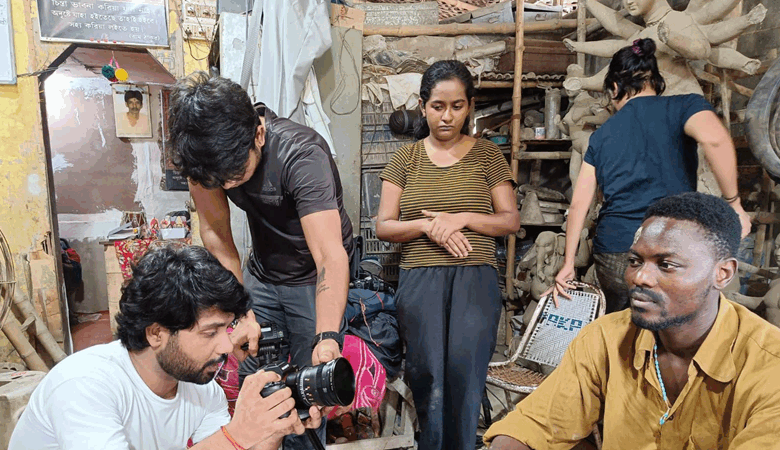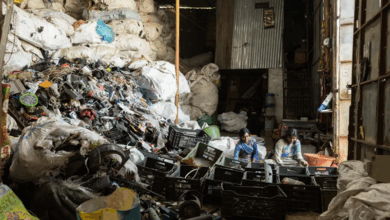India’s government-operated film schools maintain their successful streak at Cannes.
News Mania Desk / Piyal Chatterjee / 17th May 2025

Last summer, a diploma film from the Film and Television Institute of India (FTII) in Pune dazzled at the Cannes Film Festival with a Banjara sunrise folk story, securing the highest award for film school submissions globally. As the Cannes festival commenced on May 13, another film school from India is aspiring to replicate FTII’s extraordinary success story this year.
One year after FTII’s Sunflowers Were the First to Know, directed by Chidananda S Naik, secured the First Prize in the Cannes festival’s La Cinef competition for film schools, the Satyajit Ray Film and Television Institute (SRFTI) in Kolkata is competing for the 15,000-euro (approximately 14 lakh rupees) grand prize.
A Doll Crafted from Clay by SRFTI student Kokob Gebrehaweria Tesfay is included in La Cinef, which features 16 submissions this year. Filmed in Kolkata, the 24-minute movie narrates the tale of a Nigerian footballer competing in a seven-a-side tournament in the city as he fights to stay afloat following injuries that prevent him from participating in the games.
The SRFTI film, chosen for La Cinef from 2,700 submissions made by film schools globally, keeps up the successful trend of India’s film schools at the Cannes Film Festival. India’s involvement in Cannes La Cinef for the second consecutive year highlights the success of its state-run film schools, inspired by the former Soviet Union’s model.
Established in 1960, the FTII and the SRFTI, which was set up in 1996, were inspired by the Russian State University of Cinematography (VGIK), the oldest film school globally, founded in 1919, where iconic Russian directors such as Sergie Eisenstein and Sergie Bondarchuk taught.
“The FTII opens up a student’s world to various kinds of cinema,” says FTII alumnus Ranabir Das, the cinematographer of last year’s Cannes Grand Prix winner, All We Imagine As Light, directed by Payal Kapadia, who is also a former FTII student.
“Students themselves often help each other understand the world they come from better with collective and individual past experiences. This would naturally lead to unique voices coming out of the institute,” Das told at the Cannes Film Festival.
In the last five years, two movies from India’s film schools have secured the top award at La Cinef. In 2020, FTII student Ashmita Guha Neogi’s CatDog won the first prize at La Cinef, a achievement mirrored by Mysore native Naik, another FTII student, last year. Naik’s Sunflowers Were the First to Know was inspired by a Kannada Banjara folktale concerning an old woman who steals her village’s rooster, casting the village into darkness.
In 2023, Yudhajit Basu, also an FTII student, participated in Cannes’ La Cinef with his graduation film, Nehemich, which examined the longstanding tradition of isolating menstruating women to dark, muddy huts in certain rural regions of India.
Past SRFTI diploma films that competed in the film school category consist of Bengali filmmaker Anirban Dutta’s Tetris in 2006 and Darjeeling-born filmmaker Saurav Rai’s Gudh in 2016. India’s film schools made their Cannes debut in 2002 with Khoj, an SRFTI diploma film by Tridib Poddar, being chosen for the film school competition, formerly known as Cinéfondation. Kapadia would enter the competition later in 2017 when her diploma film, Afternoon Clouds, was selected as the first FTII production for the Cannes film school contest.
Established in 1998, the Cannes film school competition is a marquee event of the festival, attracting submissions from leading film schools globally. Interestingly, the second prize in the first Cannes film school competition was awarded to British filmmaker of Indian descent Asif Kapadia for his diploma film (The Sheep Thief), produced by the Royal College of Art, London, filmed in Rajasthan.
“It was a big experience for me as a budding filmmaker suddenly finding myself at one of the most influential film festivals in the world,” says Poddar, a member of the second batch of students at SRFTI, who is now a professor of direction and scriptwriting at the institute.
“The late Iranian director Abbas Kiarostami was on the jury of the film school and short film competition that year. He hugged me saying he liked my film. That was a huge reward for me,” adds Poddar. Khoj went on to win the Best First Film of a Director at the Mumbai International Film Festival (MIFF) in 2004.
“At the film institute we communicate with peers. There are discussions on cinema happening every day. It changes your perspective and broadens your vision about the world,” says Vinod Kumar, a Jalandhar, Punjab-born student of cinematography at the SRFTI, who shot A Doll Made Up of Clay. “A film’s story is not just about a character, but it is also about geography, politics, economics and society.”






